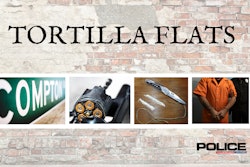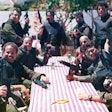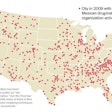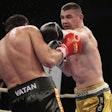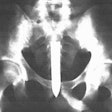How you have fallen from heaven, O morning star, son of the dawn!
You have been cast down to the earth, you who once laid low the nations!
Isaiah 14:12
He was known as “Buzzard” or just “Buzz.” And he was a member of the Aryan Brotherhood Prison Gang and an associate of AB Council member John Stinson. Only his well-known addiction to heroin kept him from reaching a leadership role.
When Buzz was not living in one of California’s most notorious prisons or the L.A. County Jail, he resided in the Los Angeles suburb of Hawaiian Gardens. Because he grew up with Hispanic gang members and shot dope with them, he was also a close associate of the Hispanics in the Hawaiian Gardens gang. The Aryan Brotherhood gang was aligned with the Mexican Mafia and so Buzz became a friend of Mexican Mafia founder and Hawaiian Gardens gang member Luis “Huero Buff” Flores.
Buzz was a skinny 5-foot, 10-inch man with blond hair and blue eyes, and he was no saint.
He was arrested originally for a 1984 Torrance murder and became the longest continual county jail prisoner until 1992 when he was finally convicted of a separate 1990 assault and sent to San Luis Obispo prison.
He was also involved in drug dealing and all types of larceny, but he was not especially violent. Make no mistake, he had made his bones and could clearly defend himself if required. But what he was really good at was transport. Buzz was the “go to guy” for prison gangs when they needed to move dope or weapons in or out of the facility.
That talent with smuggling put Buzz in an excellent position to gain knowledge of the inner workings and plans of prison gangs. And that made him a very valuable source of intelligence.
So Buzz became a police informant while in custody in the late 1980s. Then when he was released from prison, he began working for my prison gang unit. For many years he provided valuable information on the criminal activities of both the AB and the Mexican Mafia.
In truth, his drug addiction probably contributed to his decision to cooperate, but soon after started cooperating, he formed a relationship with his law enforcement handlers. They used every legal tool and resource to avoid exposing Buzz or placing him in a position where he would be required to testify in court publicly. This working relationship became more of a friendship over the years.
On the street, Buzz earned his daily bread and daily heroin by buying and delivering drugs for other users. But his real “genius” was as a “booster.” A booster is a professional shoplifter. Buzz was an expert booster skilled in every aspect of shoplifting, including how to use boxes and bags, how to switch price tags, how to return boosted items to other stores for cash, and how to dertermine what and where to steal. Buzz specialized in boosting tools and sporting equipment. This was no small time operation; he often earned hundreds of dollars a day boosting.
Buzz's town, Hawaiian Gardens, had been a city patrolled by the Los Angeles County Sheriff’s Department for many years. However when the city wanted to open a gambling casino, sheriff’s officials opposed it. The city voted to end its contract with LASD and to establish its own police department. Local gang members “encouraged” businesses and citizens to approve the city’s gambling initiative. The Hawaiian Gardens gang was especially arrogant and aggressive toward any police patrol operating in the city. We nicknamed the city, “148 City.” That stood for California Penal Code section 148: “Obstructing and interfering with the duties of a police officer.” A Hawaiian Gardens city “gang worker” who had grown up with me in Compton told me that the city government was tied to drug- and gang-related individuals in the city. My old classmate was no angel himself, and was part of a local gang program operating in Hawaiian Gardens. The gang program was a fraud.
After passing the casino initiative, the city disbanded its police force and returned to its contract with the sheriff’s department. But the local city gang members continued to be emboldened by their hold on the little city.
When the sheriff’s department came back into Hawaiian Gardens, Buzz provided us with reliable information on drug dealing, on gang members, and on a conspiracy by one city official to murder another. But Buzz avoided giving up information on his friend and primary heroin connection, Luis “Huero Buff” Flores.
Luis “Huero Buff“ Flores was the founder of the Mexican Mafia prison gang and honored in the Hawaiian Gardens gang like a decorated war hero. He had avoided prison for almost a decade. He was not on probation or parole and seemingly untouchable by law enforcement. However even he had a weakness.
We were astounded when Huero Buff requested a secret meeting in a Lakewood park with a California Department of Corrections Special Services agent and the LASD Prison Gang Unit. We naturally suspected an ambush or some other deception, and stationed undercover officers all over that park. But when Flores arrived we could see that he was emotionally distressed.
Although the infamous Flores was the poster boy for Hispanic gangs, he had raised his son to avoid any associations with gangs or drugs. His son had become a successful student and football star at Cerritos High School. No Hispanic gang member would dare touch him. But Flores’ son had become entangled in a beef with Filipino gang members who threatened the boy’s life. That was why his father wanted to talk with us.
Huero Buff said he had thought about having the Filipino gang members killed, their homes shot up, or arming his son, but any way you sliced it there would be certain retaliation against his son and the family. He asked if there was any way for us to help his son out.
I asked Huero Buff for the names of the gang members that were threatening his son, but Flores said he could not do that. He could not provide information to the police (officially) against other gang members. He was clearly torn between his gang code of conduct and his laudable concern for his son’s safety. I saw tears form in his eyes, and they rolled slowly down his leathered cheeks. We all genuinely felt sorry for him. We parted then as respectful adversaries.
Sadly Luis Flores’s son was unable to avoid the inevitable confrontation with the Filipino gang members. I guess his eventual drug and gang involvement was also unavoidable. This is not what Huero Buff wanted for his son. He had spent 18 years trying to prevent his son falling into the hell he had made for himself. Frustrated and broken, Huero Buff Flores retreated into the world of heroin addiction.
Within a year, Buzz began expressing concern for his friend Huero Buff Flores. He felt that Flores had narrowly escaped overdosing several times and was very sick. Flores would remain at home sitting on the toilet with his pants pulled down, shooting heroin into his legs for several days at a time. He was not eating or involved in any everyday activities except shooting dope and nodding off on the toilet. Buzz felt that he would soon be dead.
Rumors had also begun to surface that Buzz was a police informant, so his life expectancy as a snitch was quickly fading. He was good for maybe one more caper.
So we devised a plan to make a heroin “buy-bust” on Huero Buff. He was a target because he was a heroin dealer, but also because of Buzz’s concern for his life. Buzz was just about the only person who could pull this off anyway. The buy was made. Flores handed the heroin to Buzz while sitting on that toilet. Then Prison Gang Unit Det. Frank Durazo wrote the warrants, and we quickly staged our raid on the Huero Buff’s house.
Buzz had not exaggerated about his friend’s condition. Flores had to be assisted off the toilet. His legs were covered in infected intravenous puncture wounds and abscesses. He was at death’s doorstep.
We had just saved the founder of the Mexican Mafia’s life by arresting him and sending him to prison. But he wouldn’t be grateful. He would quickly eliminate anyone he suspected of making the heroin buy for the police that got him arrested until he narrowed it down to Buzz.
Buzz’s days as a snitch had come to an end. Det. Durazo and I conspired and contrived informant fees and witness assistance to obtain as much money as possible—a couple of thousand dollars—to “relocate” Buzz out of the area. He had but one chance and that was to run. He could not return to Hawaiian Gardens. Buzz absconded on parole.
I didn’t hear anything from him again for more than four years. But he called me one day and asked me to meet him. He looked like a different man. And he was a different man.
First he showed me paycheck stubs for every week he had been gone, then he told me this story…
When he left L.A. four years earlier he had bought a used car for a thousand dollars and just drove it north. He ran out of money and gas somewhere near Oxnard. There, he took a job as a fry cook at a little hamburger stand, and he kicked his heroin habit by going “cold turkey” while living in his car.
The hamburger stand was frequented by “roughnecks” who worked on the offshore oil derricks. They told him the money was good and that there were no drugs on the oil rig and all workers were drug tested regularly. The oil company didn’t ask for references and couldn’t give a shit who you were or where you came from, as long as you could work. Buzz conned the foreman into hiring him.
Buzz worked hard for many long hours on the oil derrick, rotating back to the shore every two weeks with the crew. He also gained a solid reputation among the roughnecks and became one of the guys.
One day Buzz overheard two workers talking about how they were going to sue the oil company for millions. They were going to fake an accident on the derrick tower and fall into the sea. The one worker was going to cut open his forehead with a knife to fake an injury from the fall.
Buzz felt loyalty to the company and his boss for giving him a chance when he really needed one. He wanted to tell his boss but then he asked himself: “Who would believe me if my criminal past came out?” So Buzz did what he had become expert at as a police informant, he wore a wire. He bought a small tape recorder and wore it secretly. The two roughneck plotters were recorded on tape explaining their plan to Buzz.
After exposing the fakers Buzz was promoted to foreman. He met a college professor’s daughter while on the mainland and got married. However, he knew that he was a wanted parole violator, and he owed his wife the truth about his drug and criminal past. He sat down and told his wife the whole story. After listening to his tale, she encouraged him to turn himself in and promised to wait for him.
That’s why he came to me and asked me to take him in. I took Buzz to the parole office and showed his parole officer that he had beaten his heroin addiction, was gainfully employed for four years, and had become a productive member of society. He was required to complete another year of parole supervision and then he was released from parole.
Buzzard is gone now, so he need not fear the awful gang monsters that he once called friends. Breaking his gang code had saved his life and paved the way for his return to the straight world. His friend Huero Buff chose to remain bound by the Mexican Mafia’s code of conduct. It cost him his son, his freedom, and finally his life. After serving five years for drug sales, Flores returned home and celebrated by drinking a bottle of tequila. He died of alcohol poisoning.






